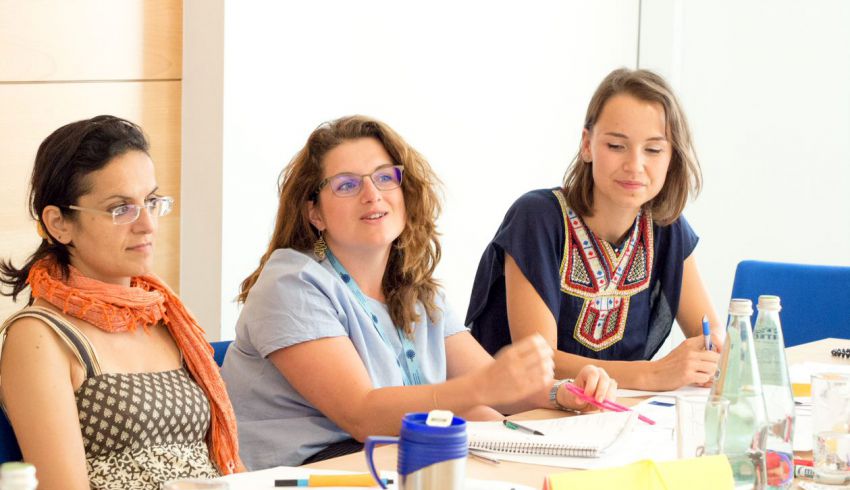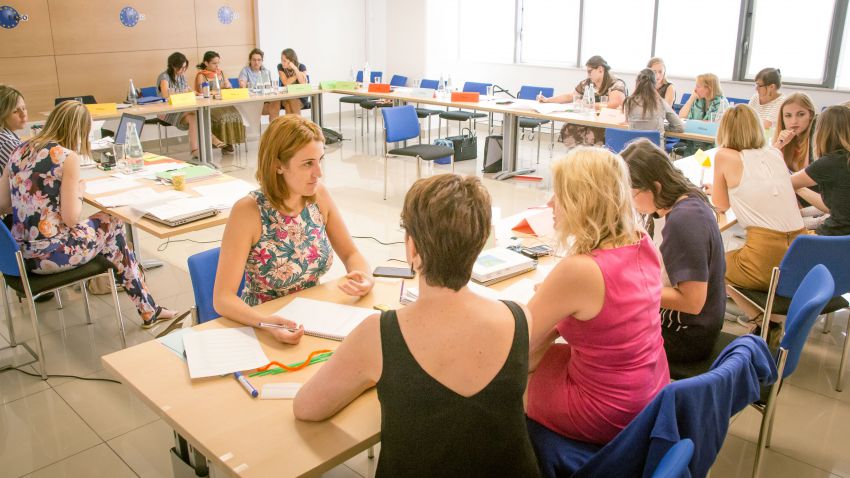Our goal is to build capacity and consolidate skills whether it is in the context of permanent support to Member States, in the context of operations or providing training support to third countries.

EUAA Training Plan
The EUAA Training Plan consists of three types of training sessions:
- Learners Curriculum is dedicated to asylum and reception officials who wish to follow EUAA training modules as learners and offers them the possibility to take accompanying assessments.
- Content Module Assessments for EUAA trainers who would like to become certified, as well as asylum and reception officials who would like to undertake relevant assessments in order to demonstrate that they have achieved the learning outcomes of the respective Modules.
- Trainers Curriculum Modules for current and future trainers in EUAA Modules, including trainers who may wish to become EUAA Certified Trainers and Assessors.
-
Tailor-made Training
EUAA Tailor-made training aims to support national asylum and reception officials on their continuous professional development.
These trainings are of short duration and aim at looking into depth in very specific matters of asylum and reception topics with focus to the following thematic areas:
- Communication and Information Provision
- Quality in Reception
- Qualification for International Protection
- Resettlement
The training is delivered in English and open to all Member States.
Tailor-made Training Plan on the Pact on Migration and Asylum
The EUAA Training Professional and Development Center has been developing a range of training products designed to help officials and other stakeholders gain a thorough understanding of the new legal frameworks and their practical implications. For detailed information, consult the Tailor-made Training Plan on the Pact on Migration and Asylum.
We respond to the training and professional development needs of national authorities by offering permanent support to EU+ countries.
Training Member State trainers
We use a train-the-trainer system as an effective and efficient way to deliver our training. This approach allows us to implement our mandate in terms of training through a multiplier effect. Participants who successfully achieve the learning outcomes of a specific module can then follow modules which cover training techniques and the assessment of learning and take thematic courses which address common challenges faced by learners in a particular module or a thematic area. They then have the knowledge and skills to deliver sessions as a trainer within their national context.
By implementing a train-the-trainer (TtT) approach, the EUAA fosters high quality independence of Member State training programmes.
Please consult the EUAA Training Plan above.
Supporting national sessions
EU+ and third countries can set-up and deliver national training sessions. These are usually organised autonomously by the national administrations and delivered by their national trainers. We open the national training sessions on our Learning Management System and providing a helpdesk. We can also support by translating training material into national languages and provide trainers when needed.

Trainer certification for qualified asylum and reception officials
The European Union Agency for Asylum is expanding its specialised training offer to give existing trainers the opportunity to become certified and able to deliver certified training sessions to asylum and reception officials across Europe.
The EUAA delivers training to asylum and reception official deployed in Member States where the Agency deploys operational support. In addition, training is also delivered to respond to the training needs of countries collaborating with the EUAA under roadmaps and other cooperation agreements. In both cases, the European Asylum Curriculum constitutes the basis for the Operational Training portfolio.
In the framework of the EUAA Operating Plans, the operational training addresses the learning needs in terms of knowledge, skills and competences of officials being deployed by the EUAA as well as officials working for the relevant national authorities.
Under the measures agreed in each Operating Plan, the EUAA develops specific learning pathways in order to support learners throughout all the phases of the procedure. For example, pathways may include training on: Effective Access to the Asylum Procedure and Registration; Reception; Backlog in the Asylum Procedure at first instance or second instance.
Moreover, other horizontal support is provided, such as: Support in the organisation of national sessions; strengthening of the national pool of trainers through regional Train-the-Trainer sessions; and support in the development of tailor-made training material.
Customised training
EAC training material can be customised to respond to the specific practical skills needed on the job by the different target groups.
For asylum personnel working in the first instance procedure and reception officers, an induction programme is offered to newcomers and newly recruited staff. The content combines theory and practice, making sure to include the set of practical skills needed on the ground.
For officers who have been already performing the job for some time, as well as for some specific profiles (such as Team Leaders, or interpreters), specific modules are offered in relation to identified learning needs. This allows them to specialise further on concrete aspects of their job according to their job profile and the tasks performed.
Pre-deployment training
Pre-deployment training is aimed at preparing deployed staff forming part of the Asylum Support Teams or experts from Member States intervening in EUAA operations. It ensures that operational personnel are familiar with the operational contexts in which they will operate and are equipped with the skills needed to carry out their tasks.

